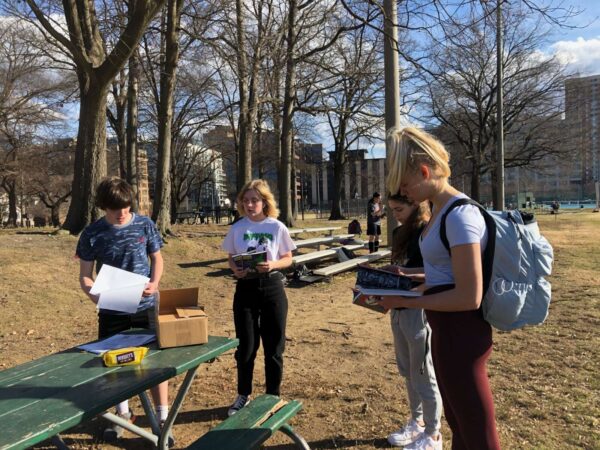
(Updated at 4:25 p.m.) This afternoon, a group of Washington-Liberty High School students are giving their peers more than 100 copies of two politically controversial books.
The books are “Beloved,” Toni Morrison’s Pulitzer Prize-winning novel following a Black family during the Reconstruction era, and “Maus,” Art Spiegelman’s award-winning graphic novel about the Holocaust and his father’s life during World War II. Both have explicit content that has some parents and politicians questioning their place in schools.
Controversy around “Beloved” is part of the origin story for a bill passed by the state Senate earlier this month, which would require teachers to label classroom materials that have sexually explicit content. “Maus,” meanwhile, rocketed into the national spotlight after a Tennessee school board voted last month to remove the book from its curriculum due to “inappropriate language” and an illustration of a nude woman.
In addition to labeling classroom materials that have sexually explicit content, the new law requires teachers to notify parents if they are going to teach the materials. It gives parents the right to opt their children out of these lessons and request alternative materials.
But some high school students in Arlington and Fairfax counties are calling the law “backdoor censorship” and organized the distribution in response. It began at 3:15 p.m. in Quincy Park, near W-L.
“Great thinkers and proud Virginians like Thomas Jefferson, Maggie Walker, James Madison, George Mason and Oliver Hill — men and women who understood the importance of education and the value of studying difficult and divisive ideas — are rolling over in their graves,” W-L freshman and giveaway organizer Aaron Zevin-Lopez said in a statement.
Zevin-Lopez tells ARLnow he teamed up with George Marshall High School student Matt Savage — who has been facilitating distributions in Northern Virginia schools this month — to host a book giveaway in Arlington.
“Kids at my school understood that the Governor was attempting to limit reading rights within schools, so we thought that handing out the books beforehand could be a great way to spread the message of resistance and making sure the youth understands our past, both good and bad,” Zevin-Lopez said.
The two students are leaders of the Virginia chapter of a Gen-Z political advocacy group called Voters of Tomorrow, which is providing financial support for the giveaway.
“When the government establishes laws to label literature in terms of a single factor like ‘sexually explicit’, regardless of that factor’s significance to the larger world of literary merit or meaning, it edges closer to censorship,” said Savage, president of Voters of Tomorrow Virginia. “It means we are labeling content for the sole purpose of suppressing it.”
Watch out @GlennYoungkin, we’ve been handing out copies of ‘Beloved’ at Virginia high schools. Students deserve access to literature that teaches real history, and we’re proud to provide it. Thanks @nachyomommy and @MrMattSavage for organizing distribution – give them a follow! pic.twitter.com/QO1AWgYyzZ
— Voters of Tomorrow Virginia (@VOTVirginia) February 23, 2022
The students say requiring teachers to define their lessons in terms of how much “sexually explicit” content it contains will dissuade them from using anything that may be considered “objectionable.” They add that the law will force teachers to draft two entire lesson plans for one class on the objection of just one parent.
The bill is similar to one passed in 2016, which became known as the “Beloved” bill because it was inspired by a mother’s attempt to have the novel removed from her son’s English class. It was vetoed, however, by Gov. Terry McAuliffe — and his veto narrowly avoided being overturned by the House of Delegates.
The question of parental involvement in education became a central theme of Gov. Glenn Youngkin’s gubernatorial campaign after McAuliffe said during a debate, “I don’t think parents should be telling schools what they should teach.”
Passing the law was a campaign promise of and priority for Youngkin when he assumed office. The Republican governor unsuccessfully tried to pass other laws, including one rooting out curriculum based on critical race theory, and created a tip line for people to report teaching strategies they object to.

